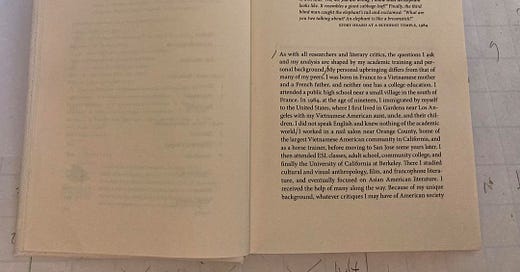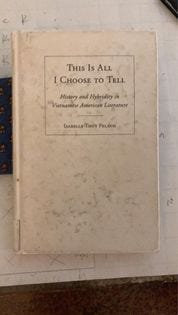This Is All I Choose to Tell: History and Hybridity in Vietnamese American Literature (ii)
from critic Isabelle Thuy Pelaud and ethnic studies
"As with all researchers and literary critics, the questions I ask and my analysis are shaped by my academic training and personal background."
Isabelle Thuy Pelaud tells us right off that like others she is an individual formed by circumstance. She does not stress which side you take, agency or structure, but that she asks questions and makes an analysis. I wonder, could she possibly be French?
"My personal upbringing differs from that of many of my peers."
Not background, upbringing. An actor in a family drama, not a monologist on a screen. She has peers.
A university press marshaled peers to bring up her book. They too have been brought up, but differently as a class from Isabelle as an individual.
"I was born in France to a Vietnamese mother and French father, and neither one has a college education. I attended a public high school near a small village in the south of France."
She doesn't say that she graduated or whether she was even on an academic track. But France schools every student from creche onwards as a cadet citizen, as we do not most university students.
Over there you don't need a college degree to be a first-class citizen but you do need connections to advance among all the equals. What, immigrants would ask me when I was working over there, are you doing here?
"In 1984, at the age of nineteen, I immigrated by myself to the United States, where I first lived in Gardena near Los Angeles with my Vietnamese American aunt, uncle, and their children."
So we got a citizen. She went work in a nail salon, learned English, and has risen from student at a community college to professor at San Francisco's great state university.
They send me their magazine where I ignore the pomp and puffery and skip to the back page, often a eulogy to a graduate whose rise was just like our author's. In my parents' generation that was normal.
We were expanding the system, a revolution of putting heads on bodies rather than the other way around. But we have long since been contracting and now as in France you need connections to get ahead.
"I owe my perseverance to my son, sixteen years old at the time of this writing, as his smile and his trust gave me the strength to keep going on the academic, activist, and creative path."
Isabelle says that her connection came from the next generation. But she goes on to thank many from her own, and the institutions that fostered her.
Recall that epic catalogue from the front of the book, the fleet of Asian American History and Culture. They were her in.
"I have high appreciation for those with whom I engage in community organizing, and many of them have become my friends through the years. I respect and admire their spirit of volunteerism."
That is, she works as well alongside those who are not her peers, who cannot review and be reviewed. And like any French visitor, say de Tocqueville, she is struck how much of our society works this way.
Next time we move on from where she is coming from to what Isabelle Thuy Pelaud chooses to tell about history and hybridity in Vietnamese American literature.
This was the second Viet Nam letter addressing Isabelle Thuy Pelaud’s This is All I Choose to Tell. The first went out April 11, 2022.
The third posted on June 15, 2022, the fourth on September 5, 2022 and the fifth on October 19, 2022.
Viet Nam letters respects the property of others under paragraph 107 of United States Code Title 17. If we asked for permission it wouldn’t be criticism. We explain our fair use at length in the letter of September 12, 2022.
The colophon of Viet Nam letters is a thumbnail version of a photograph of me speaking on a Veterans Day with the novelist David A. Willson.







Promotional copy:
Here is the second of 3 posts written so far of about a dozen total to come on a book that already has won hard use in research and teaching, to judge by the wear on the copy I have borrowed from the University of North Carolina.
Isabelle Thuy Pelaud explains in this first bit how we owe this advance in knowledge to an immigrant from France, welcomed by California and the assembled hosts of Asian American and of Ethnic studies.
It's a great story of arrival, traditional among anthropologists. The author is not of our tribe but an affine in the clans of scholarship and science. She goes on to place her thought in those of others, then to drill down on 2 specific authors,
one of whom is my very good friend who has become a vocal anti-Semite. She noted, years ago now, that he is a voice of despair. I don't think so but just at the moment her work is helping me out.
We shall get to that. Right now, Isabelle's own tale. Please consider signing up for the visible audience for these Viet Nam letters, at no charge,
or patronizing all the readers at $50/year or subsidizing the whole variety show at $250/year. It's a tzedakah though not a mitzvot. Books and authors flourish in your attention.